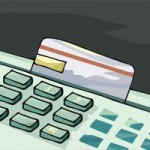 Like any other business, banks are out to make money. Traditionally, they have accomplished this by lending money that’s on deposit and collecting interest on it. But as you probably know if you have any type of bank account, banks also make a significant amount of money by charging their customers fees.
Like any other business, banks are out to make money. Traditionally, they have accomplished this by lending money that’s on deposit and collecting interest on it. But as you probably know if you have any type of bank account, banks also make a significant amount of money by charging their customers fees.
Many customers sign up for free checking accounts in an effort to avoid fees. These accounts do not pay any interest, but there are no monthly maintenance fees and usually no minimum balances. But few “free checking” customers actually get by without ever paying any type of fee. Some of the fees that might be charged include the following:
ATM fees are charged by most banks unless you use one of their ATMs to withdraw money. And when you use a foreign ATM, you’re often hit with a double whammy: your bank charges you a fee for accessing your money, and the bank that owns the ATM charges another fee for giving it to you. These fees can add up to as much as $5 per transaction. That’s a hefty charge just for accessing your own money.
If you write a check for more money than there is in your account, you will usually be charged an overdraft fee. Many banks have begun to offer courtesy overdraft protection, which means that they go ahead and pay the transaction instead of refusing it. But they still charge the overdraft fee, and if you don’t pay back the amount of the overdraft within a certain time frame (usually about five days), they can charge you even more.
If you deposit a check and it ends up bouncing, your bank could charge you a returned deposit fee. This hardly seems fair since you’re the victim of a bad check writer, but it’s a standard practice among most banks.
Those who do not have free checking could be subject to fees just for maintaining a checking account. In many cases, no fees are charged if your balance remains above the minimum. But if it drops below that amount, you may have to pay a monthly fee.
Today most banks do not return canceled checks to their customers. Some only send a statement detailing the amounts of the checks, while others send customers photocopies of them. If you need a canceled check (or a copy of it if your bank doesn’t automatically provide it), you may have to pay as much as $5 to get it.
In some cases, you might have to pay a fee when you use your bank’s bill pay feature. Most provide the service for free or on a monthly fee basis, but if you forget about a bill and need to make a payment immediately, you might end up paying an extra $5 to $15.
The fees that your bank charges you can add up in a hurry. In order to avoid them, it’s important to read the fine print when you sign up for checking accounts and other services. Don’t let the bank get rich at your expense!
Tags: Banking Advice, banking fees, Checking, checking fees
This entry was posted
on Saturday, February 6th, 2010 at 12:53 pm and is filed under Checking.
You can follow any responses to this entry through the RSS 2.0 feed.
You can leave a response, or trackback from your own site.
 Like any other business, banks are out to make money. Traditionally, they have accomplished this by lending money that’s on deposit and collecting interest on it. But as you probably know if you have any type of bank account, banks also make a significant amount of money by charging their customers fees.
Like any other business, banks are out to make money. Traditionally, they have accomplished this by lending money that’s on deposit and collecting interest on it. But as you probably know if you have any type of bank account, banks also make a significant amount of money by charging their customers fees.











